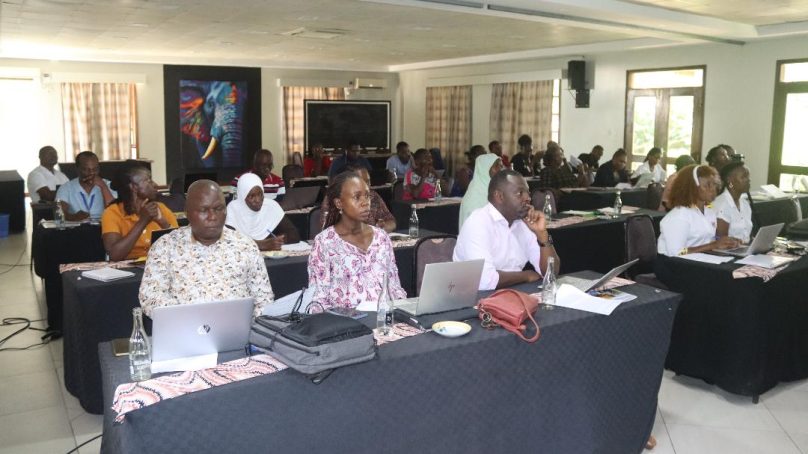
Unbeknown to health experts, the spread of and severity of female genital schistosomiasis disease is ravaging coastal Kenya. Researchers now want the national and county governments to list it at a reproductive health issue.
The research findings have put ministry of health and county health departments on high alert, with researchers recommending that female genital schistosomiasis disease be included in reproductive health to ensure that patients receive proper treatment.
This comes after a study conducted in various hospitals and clinics in Kilifi County by Liverpool Voluntary Counselling and Testing (LVCT) – a non-governmental organisation – found that 320 out of 2,000 women tested were suffering from the disease and received treatment for sexually transmitted diseases due to its symptoms, even though the disease is not sexually transmitted.
Speaking in Kilifi during the launch of the study findings, Dr Robinson Karuga from LVCT said the research further revealed that 16 per cent of the women tested were found to have female genital schistosomiasis caused by aquatic parasites produced by snails.
“In Kilifi County, we tested over 2,000 women using pelvic examination and 16 per cent of those tested were found to have contracted bilharzia and female genital schistosomiasis and for a long time, the FGS symptoms were misdiagnosed as Sexually Transmitted Diseases,” Karuga said.
According to US Centres for Diseases Control and Prevention (CDC) schistosomiasis, also known as bilharzia, is a disease caused by parasitic worms. More than 200 million people worldwide are infected. Schistosomiasis is one of the neglected tropical diseases.
It is the second most dangerous parasitic disease after malaria, information gleaned from CDC website says. The parasites that cause schistosomiasis live in certain types of freshwater snails. Although schistosomes are in the United States, they are not the species that infect people.
The infectious form of the parasite, called cercariae, comes out of the snail into the water. You can become infected if your skin comes in contact with unsafe freshwater.
A senior researcher at the organisation, Stephen Mulupi, has pointed out that inappropriate treatment for female genital schistosomiasis may compromise the body’s immune system due to the body’s adaptation to antibiotics.
Mulupi has also added that the integration of health services is one of the best measures to address financial implications that are brought up by the rise in diseases, especially with the recent withdrawal of funding from the USA-based organizations.
“We advise that female genital schistosomiasis be embedded with treatment programs on reproductive health to avoid any extra costs and as the national government, through the ministry of health make policies on the same let there be proper coordination with the 47 county governments to ensure proper implementation of the said policies on female genital schistosomiasis.” He said.
Before the study was conducted in Kilifi County, Mama Rehema Gona, a resident of Vipingo, began experiencing symptoms of itching in her private parts and passing blood in her stool two years ago, a condition that threatened to break up her marriage.
Mama Gona explains that she tried all kinds of medicines, including herbal remedies but the condition did not improve.
According to Rehema, after several misdiagnosis, she later received proper treatment through the LVCT research programme, and is currently a trainer of trainees to fellow women.
“Like two years ago, I was sick, my private parts were itching, and there were traces of blood in my stool, and I initially thought that my husband infected me, and he also thought I was the initiator, so there was no peace in my marriage. However, things changed after I received the proper treatment and completely healed, “she said.
On its part, Kilifi County government, through the director of health, Hassan Leli, has vowed to start sensitizing residents about the disease as well as providing training to nurses and doctors who provide hospital services and diagnose the disease.
In addition, Kilifi County Assembly health committee chair Edward Ziro committed to legislating policies and, in collaboration with the health docket, come up with a budget that will incorporate training and proper treatment of genital schistosomiasis.
“What remains is policy direction, which will help in empowering the health department through proper training of the nurses, doctors and other health officials to avoid misdiagnosis and also advocacy for proper treatment,” Hassan Leli said.
CDC says schistosoma eggs enter freshwater when people with schistosomiasis urinate (pee) or defecate (poop) in the water. The eggs hatch, infect a specific type of freshwater snail, develop and multiply inside the snails. The Schistosoma parasite leaves the snail and enters the water, where it can live for about 48 hours.
The parasite enters the skin of people who are in contact with unsafe water. Within weeks, the parasites turn into adult worms in the blood vessels of the body.
The female worms produce eggs that travel to the bladder or intestine and come out in urine or stool (poop).
- A Tell Media / KNA report / By Stephen Mrira







